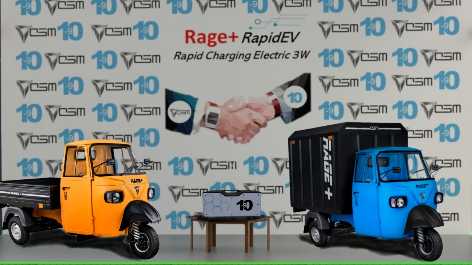Nanotechnology-based startup-Log 9, On 14 July, announced the trials of the new rapid charging EV batteries in several cities to bring down the charging time from several hours to only 15 minutes and making the EVs go for 60 Km in one charge. The startup aims to equip the two-wheelers and three-wheelers with rapid charging batteries to attaining a global vision of the ‘Clean Energy Transition.’
A never-ending scope of e-mobility in Indian roads is undergoing limelight these days. But, If EV vehicles are envisioned for the fleet of e-commercial deliveries and other commercial services, the efficiency of EV batteries have to be upgraded for their mass adoption.
The rapid charging battery developed by Log 9 is designed to last for more than 15 years. Unlike other conventional batteries, which get degraded due to slow charging capacity and repeated charging-discharging cycles, the log 9’s fast-charging batteries will not only reduce the charging time up to 80% but also, minimize the impact due to charging cycles. The battery comes with a warranty period of 10 years for standalone and stationary applications.

Adding to this, log 9 fast-charging batteries are adaptable to temperature variations. They can perform efficiently in the temperature range of -30 to 60 0 C. The weather adaptability of the model adds to the applicability of EV as per underlying EV policies. Log 9 chargers have a GBT connector plug for Two-wheelers and three-wheelers which will enable the connection with a 32 AMP power socket. The charging cost will range from Rs. 70-100 depending upon the charging providing stations. Moreover, any standard charger with GB/T connector and 48V support can be used.
“Our priority is to make charging timed very short, which will elongate the battery life despite the heavy commercial application. We will start commercial services shortly, in two to three months,” said Akshay Singhal, Founder and CEO, Log 9 Materials.
Briefing the services, he further says, “The charge for three-wheeler EV will be Rs. 4000 for the 2,500 km. Subsequently, we will decide to plan the tariff for two-wheelers. We will introduce a lease-based model for the EV batteries to reduce their cost thus, making them affordable for the commercial owners. We have partnered with leading public charging providers to provide exclusive affordability to our customers,' the officials claimed about cost affordability of the rapid charging EV batteries.
The ultimate steps for finding a sustainable solution to the transportation problems in India rendered to plan for instilling a spark of the e-mobility revolution in India. But, with the increasing demand for the production of EV vehicles, substantial challenges have been aroused due to the long-charging time thereby, downgrading the productivity of EV vehicles, which they are capable of. Log 9s vision “NO MORE DOWNTIME FOR DELIVERY FLEET” is now transcending the narrow walls in the e-mobility revolution.
Collaborating for the Future: Plan’s Pace so far
 The startup, 'Log 9 Materials' has tied up with Omega Seiki Mobility, which is an automotive industry specialized in EV vehicles, particularly in Electric two-wheelers, Electric three-wheelers, and Electric cargo three-wheelers. In addition to this, the company has approached eight others for collaboration.
The startup, 'Log 9 Materials' has tied up with Omega Seiki Mobility, which is an automotive industry specialized in EV vehicles, particularly in Electric two-wheelers, Electric three-wheelers, and Electric cargo three-wheelers. In addition to this, the company has approached eight others for collaboration.
Log 9 Materials, by partnering with Omega Sieky Mobility will forerun its Three-Wheeler Platform Range with Rapid EV. The Range with Rapid EV will bring about a distinguished platform in Indian EV manufacturing. The startup has already geared up a 40 cr investment to convert the standard lithium-ion batteries into fast-charging batteries. It is still looking for the capital of 10-20 million dollars to commercialize the research on fast charging technology.
There is high alertness across the globe concerning EV manufacturing. But, at the same time, the conversion rate is low. Surplus consumers and the profit of EV manufactures are the main factors for attaining renewable dependency. With high demand and low adoption, India is an untapped market in the EV sector. Thus, this rapid charging technology is expected to tap the untapped EV potential of the country. Energy needs are going up, but energy storage solutions are still unexplored.







